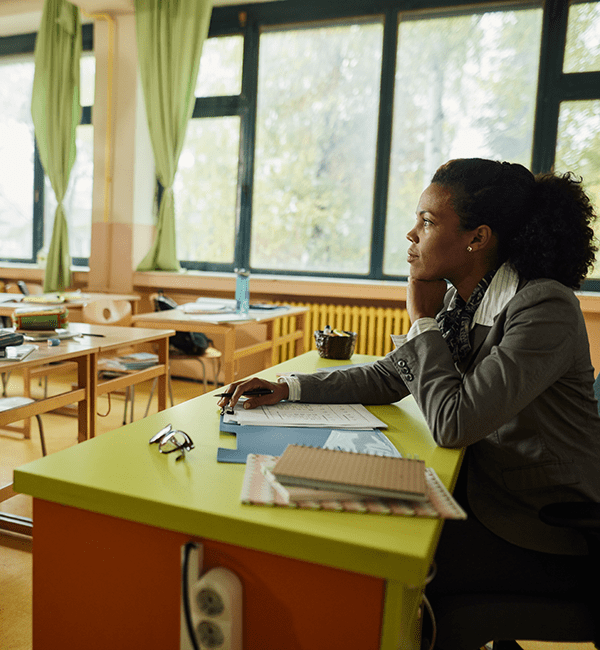Erikson Institute, a graduate school in child development, has launched an innovative Master of Science in Early Childhood Education (MSECE) licensure program with a triple endorsement in early education, special education, and bilingual/English as a Second Language (ESL). The first-of-its-kind master’s program in Illinois aims to diversify the early childhood workforce while increasing the number of highly qualified teachers in divested communities.
This is the second in a series of blogs about the program, featuring Sandra Osorio, PhD. Dr. Osorio is the program director for Erikson’s teacher licensure master’s degree. This installment looks at Reflective Practice as a distinguishing feature of the program.
Q: Reflective Practice is a signature feature of an Erikson education. How will teacher licensure students experience it?
A: Reflective practice is a method for merging theory and practice by intentionally reflecting on thoughts, actions, and intentions to better learn and enhance professional and personal practice. Our faculty are skilled in this approach, which is the hallmark of an Erikson education. Reflective practice is woven into our curriculum and is seen most clearly in our seminar classes, where students share their thoughts and feelings about what they are learning in class and later, during student teaching. Faculty guide students in having honest, meaningful conversations about their learning experiences, their emotional and behavioral reactions to what they are learning, and how they are developing insight about themselves and others.
Q: Why is Reflective Practice so important for early childhood educators?
A: Reflective practice is an active and intentional way of functioning, and early childhood educators need to be active and intentional in their work with young learners.
An example of how this can come up is when children are in the classroom and being asked to sit still and quietly. Depending on their age, that can be developmentally appropriate for many kids for a brief period. However, the stressors and pressures that are placed on teachers may require them to have the children to sit still for a longer period of time, and some children will begin moving, swaying, tapping, and talking. Often, a teacher may see this as disruptive behavior, and will respond based on their understanding and ability in the moment. If a teacher feels overwhelmed, unsupported, or disrespected, they may raise their voice or propose punitive consequences for the behavior—like a loss of play time. However, if this teacher has experience in reflecting on their reactions, identifying what is upsetting them, and then responding to the children in their care in developmentally appropriate ways, they will pause before reacting (I’m feeling upset), note their own needs (I feel like no one in this school listens to me), figure out how to meet that need (I’ll talk to my mentor teacher about this), and move quickly to address the children’s needs (these first graders need to move—let’s put on music and march around the room). This teacher is able to understand their own feelings and reactions before acting, and is therefore able to see what the children’s behavior is communicating about what they need in the moment.
Q: How is Reflective Practice part of the Professional Learning Community?
A: We created the Professional Learning Community (PLC) in response to educator needs. For our reimagined triple endorsement, we knew that streamlining and refreshing the curriculum was not enough—to really become change agents in their classrooms and in school systems, teachers need ongoing, reflective support. The PLC is how our graduates will continue to have a reflective practice with other teachers, as a way to exercise self-care and nurture their ongoing professional development. The first few years of teaching can be some of the most challenging and isolating in a teacher’s career. By having a PLC to lean on, teachers will learn from others, give and receive support, and be reminded that the hard work they are doing is transforming children’s lives and inequitable school systems.
Q: Why is ongoing support important for new teachers?
A: As the COVID-19 pandemic has transitioned to our current life, it taught us that educators need and deserve to have more support in their environments. Through the PLC, graduate students and postgraduate students will come together and connect. The PLC supports self-care, reflective practice, and professional development. Participants will also receive required professional development credit for continuing to reflect with their colleagues. Setting up a time to intentionally commit to self-care, we know allows educators to be more regulated, and to respond more effectively to their student’s diverse needs. We reimagined this teacher licensure program to not only recruit individuals into the profession, but also retain them, and for that to happen educators must feel supported. The first couple of years as a teacher can be overwhelming but by creating a space for educators to come together to share both their successes and challenges, we can support each other and continue to do the important work of educating children to their full potential.

Join the Erikson family with monthly news + events updates shared by academics, community members, and families.